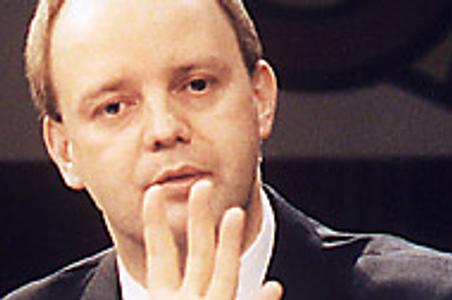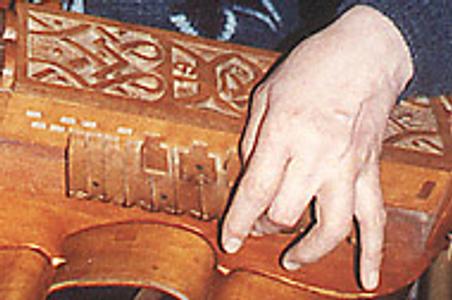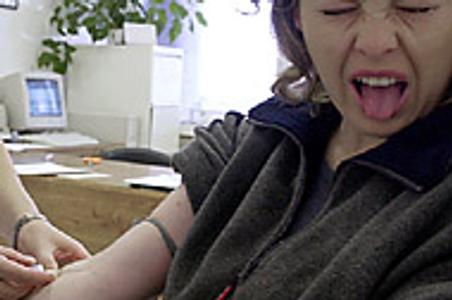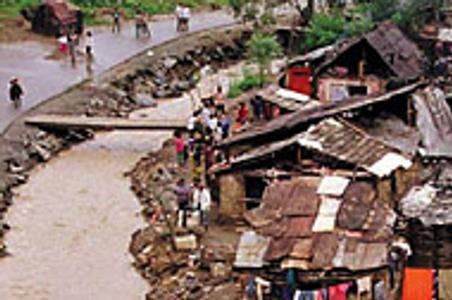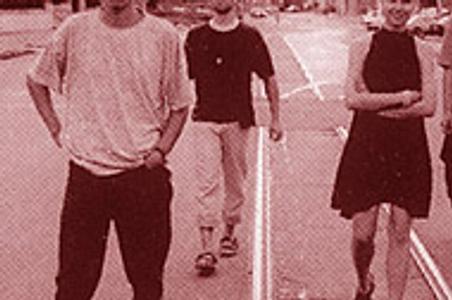Archive of articles - March 2001
If you desire to read an old article, use the search bar or select the publication date.
Little hope for looser loans after bank sale
Representatives of Slovakia's second largest bank, Všeobecná úverová banka (VÚB), have stressed that following privatisation the bank's policies on loan provision would not change, dampening any hope which businesses may have had of a lessening of presently strict criteria after new management takes over.With VÚB holding the lion's share of the lending market - 26.5% in total - news on March 21 that two foreign banks had proceeded to a second round of the bank's privatisation prompted speculation that VÚB might follow the possible lead of a rival bank and loosen up its conditions for obtaining credit. The move would be a welcome boon for corporations struggling to meet what they have repeatedly called the severe lending criteria at almost all banks in Slovakia.
Around Slovakia
Drunk name day celebrant crashes into police carCasting for Uprising brings 1,700 potential actorsSlovak posing as Congolese diplomat exposedPaedophile sentenced to 14 and a half yearsMobile phone stolen while owner telephonesYouth dies after skateboard dispute with mom
Debt imperils hospital care
The eastern Slovak town of Medzilaborce has had water supplies to its hospital cut off. Trnava hospital phones have been disconnected, and its bank accounts have been blocked. Doctors in Ilava hospital, in central Slovakia, meet every month to decide whether they can perform theatre operations or not. Hospitals in the Spiš and Košice regions have been inundated with letters from utilities demanding they pay bills or suffer property to be seized."The situation is critical. Insurance companies and utilities send us letters demanding payment. We only hope they won't cut off supplies and phones. The worst thing is that it is the patient that is on the receiving end of all this, and not through any fault of ours," said Marián Glova, deputy financial director of Košice's L. Pasteur hospital.
TV ridiculed for phone bugging story
The private TV station Markíza ran a recent news report claiming to offer viewers a means of checking if their mobile phones were bugged.According to the March 14 and 15 reports, mobile owners had only to dial #31#0017604330002, and then wait: if they heard a long beeping signal, their phone was bugged. If they received a 'wrong number' signal, they were in the clear.The response from experts and mobile operators was as swift as it was derisive. Representatives of the Slovak secret police (SIS) - the only Slovak body legally allowed to tap phones - called the report "technical gibberish". Eva Güttlerová, spokesperson for Slovak mobile phone operator Globtel, added: "This report was absolute nonsense."
News Briefs
SkyEurope plans summer operational launchPoll shows HZDS most popular partySlovak alcohol consumption has dropped since 1990
Community Corner
Dutch Embassy ConcertCzech-Slovak film festivalItalian Institute Film FestivalAustrian Embassy eventsFrench Institute exhibitionsGoethe Institute exhibitionSwedish exhibition for the disabledSpanish exhibition at DanubianaBahá'í Community
The lost art of hurdy-gurdys revived
Craftsman Tibor Koblíček didn't make his first Slovak folk instrument until after his 30th birthday. Now, at age 63, he has trouble counting how many he can make."Whew," he says when asked, standing ankle-deep in sawdust, tools and half-finished instruments. "A heck of a lot."Walking through his home in the central Slovak village of Turičky, population 250, Koblíček counts off at least 15 distinct names of instruments in piles seemingly everywhere. Last summer, Koblíček took 50 of these instruments to Slovakia's World Fair exhibit
Opposition puts new early elections case
Slovakia's calendar for the year 2002 already contains a number of significant events: Parliamentary elections are set for the end of September, while a few months later, a summit of NATO countries in Prague will decide if Slovakia becomes a new member of the military alliance.For the country's political opposition, the timing of the critical Prague NATO Summit is a strong argument for moving parliamentary elections up a few months, perhaps to June 2002, in order to give the new government time to pick its ministers and draw up a program manifesto before its NATO-worthiness is judged.No politician advocates changing election dates more fervently than Robert Fico, leader of the non-parliamentary party Smer.
Managing Slovakia's waste: the plusses of EU harmonisation
Last month we saw that contaminated land is an issue where the European Union requires relatively little from a candidate country like Slovakia. In the area of waste management, by contrast, there is a whole raft of legislation that Slovakia will have to implement on the path to EU membership.New legislation on waste that has been many years in the pipeline is undergoing passage into law this year. This will help to bring Slovakia into line with EU standards, although further legislation will be needed to finish the job. The new law, while helping tackle some of the country's most pressing problems, has not been without controversy.
Sighs of relief as VÚB gets interest
A Finance Ministry announcement March 21 that Italy's Banca Commerciale Italiana and French Societe General had been short-listed for the second phase of privatisation of a 67% stake in Slovakia's second largest bank, Všeobecná úverová banka (VÚB), met with a collective sigh of relief from analysts who had feared the bank's sale would receive no interest."I'd heard rumours only a few days before that there was no one interested in VÚB, and that would have been very bad" said Miloš Božek, analyst at J & T Securities. "The fact that only two banks are interested could be viewed as a bit disappointing, because there won't be much competition [in bidding], but it is at least good that there is some interest."Following what was widely regarded in the banking sector as a successful 18 billion crown ($380 million) sale of VÚB's main market rival and Slovakia's biggest bank, Slovenská sporiteľňa (SLSP), to Austria's Erste Bank in December last year, the government's task of privatising VÚB, analysts had warned, was going to be much harder.
Point/Counterpoint
Women deserve a break......but equality a bigger issue
Culture Shock: Hospitals still shock even most jaded
That the Slovak health-care sector is in crisis is old news not only to Slovaks themselves but also to foreign residents of the country.The current system of funding - in which working people, firms and the state pay premiums to health insurance firms, which in turn fund hospitals and treatment - is not working, but finding a better way has proven beyond the powers of those in charge. And thus, every six months or so, the price of drugs goes up, another hospital declares a state of emergency, and a chorus of complaints is heard, from citizens about medical care and from medics about their abysmal salaries.Not that the sector is entirely without income. Bribery in health care is standard: retired patients distribute candies and coffee, pregnant women give obstetricians 5,000 Slovak crowns ($100) and more to 'ensure' proper care during the birth of their children, and richer patients pay into five figures even for non-elective surgery, and of course far more for plastic surgery. Polls carried out by the Focus agency in 2000 showed that Slovak citizens regard health care as the most corrupt sector in the economy.
Opposition seen as potential NATO barrier
If early elections removed the current government from power and put the current opposition in its place, analysts say that Slovakia's NATO ambitions could be endangered.Although the main opposition party (and the most popular party in the country) the Movement for a Democratic Slovakia (HZDS) has voiced its support for NATO integration, its devotion to the aim has been questioned. The other main opposition party, the Slovak National Party (SNS), has been and remains today unambiguously opposed."We support Slovakia's EU entry, but we reject NATO entry," said Štefan Zelník, leader of the SNS parliamentary caucus. "We see no reason why we should invest money into arms when it could be used much more effectively at home."
New gulf divides Roma and police
Recent allegations of police brutality and hate-crimes committed against Slovak Roma in the Prešov and Košice regions have been not only denied by police, but also interpreted as an attempt by some Roma to generate sufficient hysteria among the minority to fuel another wave of migration to western countries. The police reaction has highlighted the gulf in how the Roma and law enforcement officers perceive each other, a gulf which analysts say is preventing solution of the minority's serious problems.In the latest apparent incident of racial violence, a 38 year-old Roma woman from Košice, named Eva Csiszárová, alleged March 20 that a group of around 15 skinheads had beaten her and her 10 year-old daughter Ivana, doused her in gasoline and tried to set her aflame. According to the daily paper Sme, the skinheads departed after failing to find matches; the two victims then fled to their home in the Luník IX Roma ghetto.
Stopping ST bullying: Who's going to make them?
With 21 months to go before the Slovak telecom market is fully liberalised, an entertaining squabble has erupted between those who want to milk the monopoly enjoyed on voice services by Slovak Telecom for all it's worth, and those who want to see Slovak Telecom's bullying tactics condignly punished.The focus of the battle is a set of filters installed by ST on its phone lines last year. These filters were not applied to regular voice lines, but rather to customers using permanently open data circuits (i.e. universities, large firms) which require much higher frequencies. These special ST customers had been using the old style 'analogue' cables (basic copper wires, as opposed to optic fibres) with special 'DSL' modems that enabled them to transmit data at high speed along the inefficient analogue lines.
Internet providers take ST to task again
Frustrated private Internet providers filed a complaint with the Bratislava Regional Prosecutor's Office against telecom monopoly Slovenské Telekomunikácie (Slovak Telecom - ST) March 13, alleging that the firm had broken the law by refusing to abide by the ruling of a market watchdog.The Slovak Anti-Monopoly Office (PMÚ) ruled February 22 that ST had to remove a series of 'filters' it had placed on lines used by its clients exclusively for data transfers. The filters, which limited the frequencies the lines could carry, meant that high-frequency Internet access became virtually impossible; to have the filters removed, customers had to pay ST to install a 'digital circuit' at almost twice the price of the original line.The PMÚ fined ST 10 million Slovak crowns ($213,000) and ordered the filters be removed within 15 days of its decision. But Internet providers say the filters have not yet been removed, and have asked the PMÚ to investigate hitting ST with yet another fine.
Top Pick: Modern Folk lives through Živé Kvety
Živé Kvety (Live Flowers) is a band of four men and one women searching for directness, openness and simplicity in music; living in Bratislava, they count Lou Reed, Neil Young and Bob Dylan as their musical inspirations; they perform soft rock and ballads; and they will hold a concert at Dom Kultúry Lúky on Friday, March 30.The band was formed in 1992, when guitarist and composer Peter Bálik met lead-singer and lyricist Lucia Piussi. "He came to one of my performances. We met and started to realise our musical plans we only dreamed about," said Piussi, also an actress at Bratislava's Stoka theatre.The band's easy-going songs tell simple and frank stories about love and life in Bratislava. Their self-titled debut album was released in 1999, with songs created mainly during their free time.Since then, the band's repertoire has slightly changed.
Health care: Ounces vs. pounds
If there were any justice in the world, a steady diet of fried cheese and draft beer should be enough to ensure constant rude health. Nevertheless, foreigners living in Slovakia do occasionally get sick (usually because of an imbalance between the beer and cheese). Since being sick in a foreign country is twice as miserable as falling ill in familiar surroundings, it pays to know a few things about visiting the doctor before your throat is swollen shut.The first thing to know is that doctors here know as much as doctors anywhere, and that unless you have a really obscure disease, you're wasting your time going to Austria for medical care at trouncing expense. Buy Slovak.The second thing you should bear in mind is that the Slovak health care system is seriously short of money, and you're not going to see many frills in your visit to the doctor. But if you're hung up on frills, you're probably not all that sick.
Business Briefs
Lyonnaise des Eaux to bid for Bratislava water utilityBus manufacturer SlovBus forms joint venture with ZAOPower supplies to Slovak Rail back onFNM announces tender for shipping companyJapanese agency moves Slovakia to BBB rating
- Weekend: Celebration of fun comes to Malacky Photo
- No more photos or bank statements? Slovakia moves to ease residence process
- News digest: Fico’s bloc wants to save money by restricting electoral access
- Slovakia loses another EV model to Spain as Stellantis chooses Zaragoza over Trnava
- Top 10 events in Bratislava for foreigners
- Convicted of multiple murders, Slovakia’s mafia boss seeks release from prison
- 3 free things to do in Bratislava in the next seven days
- Slovakia plans to restrict access to new medicines amid funding shortfall
- Maria Theresa on the banks of Bratislava
- No more photos or bank statements? Slovakia moves to ease residence process
- 3 free things to do in Bratislava in the next seven days
- Digital Jarvis is real now. He is coming for your to-do list
- Weekend: Celebration of fun comes to Malacky Photo
- News digest: Fico’s bloc wants to save money by restricting electoral access
- The disinformation scene has become a tool of media capture
- Slovakia plans to restrict access to new medicines amid funding shortfall
- Maria Theresa on the banks of Bratislava
- No more photos or bank statements? Slovakia moves to ease residence process
- News digest: Violent gang in Bratislava is under arrest
- The Kremlin’s security agency has a Russian contractor in Slovakia - no one has noticed
- 3 free things to do in Bratislava in the next seven days
- Digital Jarvis is real now. He is coming for your to-do list
- Weekend: Celebration of fun comes to Malacky Photo
- The disinformation scene has become a tool of media capture
- Maria Theresa on the banks of Bratislava
- A mayor resigns over €2.7 million fraud scandal at town hall
- Show me your moves! Slovak hockey stars share their best pick-up lines
- No more photos or bank statements? Slovakia moves to ease residence process
- He designed Gatwick. But this is his masterpiece
- Fico praises China and Vietnam as models, says liberal democracy has failed
- News digest: Violent gang in Bratislava is under arrest
- The compass points to Kúty, and people are starting to follow
- News digest: Prosecutor seeks jail for NBS Governor Kažimír as his political support wanes
- Slovakia loses another EV model to Spain as Stellantis chooses Zaragoza over Trnava
- Slovak female triathlete shatters barriers with historic win at Himalayan event
- Weekend: Celebration of fun comes to Malacky Photo
- News digest: Fico’s bloc wants to save money by restricting electoral access
- Slovakia plans to restrict access to new medicines amid funding shortfall
- No more photos or bank statements? Slovakia moves to ease residence process
- Top 10 events in Bratislava for foreigners More articles ›




